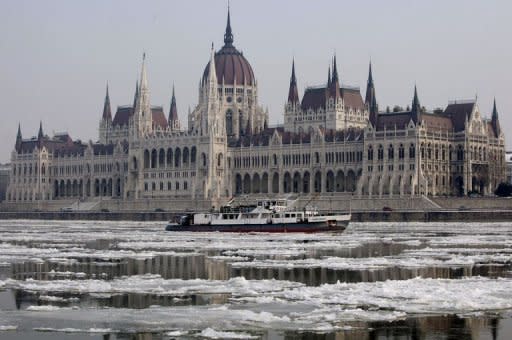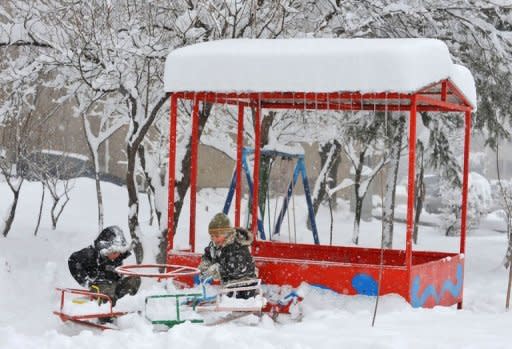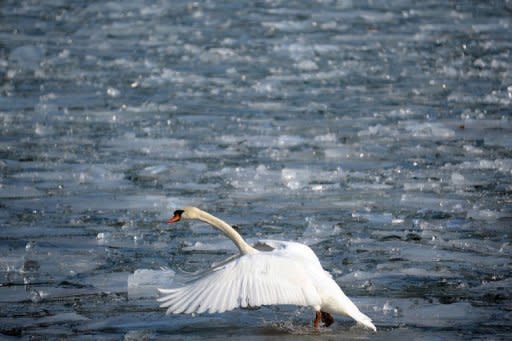Hungary orders Danube closed amid big freeze
Hungary closed the Danube to river traffic Friday due to thick ice, bringing shipping to a near standstill on Europe's busiest waterway, as the continent's cold snap death toll passed 540. "Shipping was ordered stopped overnight Thursday to Friday because of conditions created by icing along the Hungarian part of the river," Istvan Lang, who heads the national technical supervisory body OMIT said. "All ships still underway must immediately head for the closest harbour," Lang, quoted by MTI news agency, said. Hungary's navy had to send its biggest icebreaker, the Szechenyi, to try to ram through the frozen river at Budapest. "I've not seen so much ice on the Danube since 1985," said its captain, Dezso Kovacs. The freeze had already forced other countries along the Danube, including Austria, Croatia, Serbia, and Bulgaria, to suspend river traffic. The 2,860-kilometre (1,780-mile) river, which flows through 10 countries and is vital for transport, power, irrigation, industry and fishing, was nearly wholly blocked, from Austria to its mouth on the Black Sea. Forecasters expect the cold snap, which started two weeks ago, to continue until mid-February. So far the freeze has claimed 37 lives in the Balkans -- 16 in Serbia, 11 in Bosnia, five in Slovakia, four in Montenegro, three in Croatia, two in Macedonia and one in Albania. At least 135 people have died of the cold in the Ukraine, 82 in Poland, 46 in Russia, 25 in the Czech Republic, and 24 in Lithuania. Serbia's government reduced power supplies to 2,000 companies it said were not vital to everyday life and appealed to consumers to cut energy use by 10 percent. But consumption hit 162.67 million kWh per day -- which local media said was around 10 percent more than the same period last year. Predrag Maric, Serbia's chief emergency official, told state television helicopters were delivering food to remote areas of southwestern Serbia where 70,000 people have been cut off for days. And Zoran Manasijevic of state-run Electric Power Industry of Serbia warned that vital energy imports would drop when Bulgaria cut its supply on Monday, "which will make our situation harder." In neighbouring Bosnia, an army helicopter had to make an emergency landing while transporting provisions to isolated villages in the southern Kalinovik region. The chopper was damaged but all 11 crew members were well. They were evacuated by a helicopter of EU peacekeepers stationed in Bosnia. In Romania, the death toll had risen to 57 since the start of the cold spell, with more than 20,000 people still cut off by snow in the east of the country where food was running out. In the southern village of Varasti, inhabitants had to tunnel their way out from under four metres (13 feet) of snow. "I fear all my hens and turkeys are dead," said Varasti resident Marin Boacana, 60, pointing to his snow-covered chicken coop. Rome braced for fresh snow, with forecasters predicting up to 30 centimetres (11 inches). At the Porta Portese street market, snow chains have been selling for up to 400 euros ($530) in recent days, following a city order that all cars must be equipped in case of heavy snow. In the city of Padua in the northeast, firefighters had to hack down a three-metre (10-foot) icicle weighing 50 kilos (110 pounds). A 42-year Romanian woman, believed to be sleeping rough was found frozen to death in a cave in the Rome suburbs, while a man was reportedly attacked by scavenging stray dogs near Rimini. On the island of Sardinia, a man died apparently from hypothermia shortly after coming out of a hospital dressed only in pyjamas and slippers. In Bulgaria where 32 have died, authorities continued a massive relief effort in the southeastern village of Biser, submerged under the icy waters of a nearby dam that burst on Monday. The ensuing floods killed 10 people. In France, the death toll increased to at least 12 as the cold claimed two more lives. A nuclear reactor at the Cattenom plant shut down because of a fault, placing fresh pressure on the already strained national power grid Friday, state energy giant EDF said. And for the first time time since World War II, Azerbaijan set up shelters for homeless people in the capital Baku on Friday.




